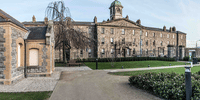It has developed rapidly in the last decade as new technology has made it possible to study genes in much greater detail and to rapidly sequence the genomes of humans and other species. A few examples of remarkable advances in knowledge include:
- The sequencing and analysis of hundreds of thousands of complete human genomes
- The development of genetic and stem-cell-based therapies for inherited disorders
- The ability to trace the evolution of humankind using ancient genomics
- The application of genomics to cancer medicine
Human Genetics: The course for you?
If you are interested in understanding how genetics is central to controlling every cell and its functions including the 10-100 trillion cells in the human body, to directing intricate programmes of development and to causing many different disorders when perturbed, this is the right course for you.?
If you want to understand how genetic information is driving the development of novel therapies, is enabling the individualisation of medicines targeted towards patients? needs, is revealing our ancestries and how it underpins evolutionary biology, this is the degree for you.
Graduate skills and career opportunities
Many Human Genetics graduates go on to higher degrees (M.Sc. and/or PhD.) and take up careers in research in either academia or industry. Opportunities exist in biotechnology and pharmaceutical companies, medical or clinical diagnostic laboratories, forensics, public health and epidemiology programmes, and in teaching. Genetic counselling is a rapidly expanding field that might also interest you.?
Other graduates have gone into careers such as medicine, patent law or science journalism. Even if you choose a career not directly related to the scientific subject, the skills of critical thinking and problem solving provided by the Human Genetics degree will put you in high demand.
Your degree and what you?ll study
During third year, students will learn about the fundamentals of Human Genetics through a combination of lecture courses and practical classes. To this end, students will be exposed to different areas of Human Genetics ranging from medical genetics to the genetic programmes underpinning cell biology.?
Practical classes teach students about key techniques and analysis methods that are widely used in Human Genetics. In fourth year, students can choose, largely depending on their interests, from various lecture courses in different areas of Human Genetics. Students spend 10 to 12 weeks in a laboratory in the Institute and participate in on-going cutting edge research projects. Furthermore students write an in-depth literature review on a current topic in Human Genetics.










